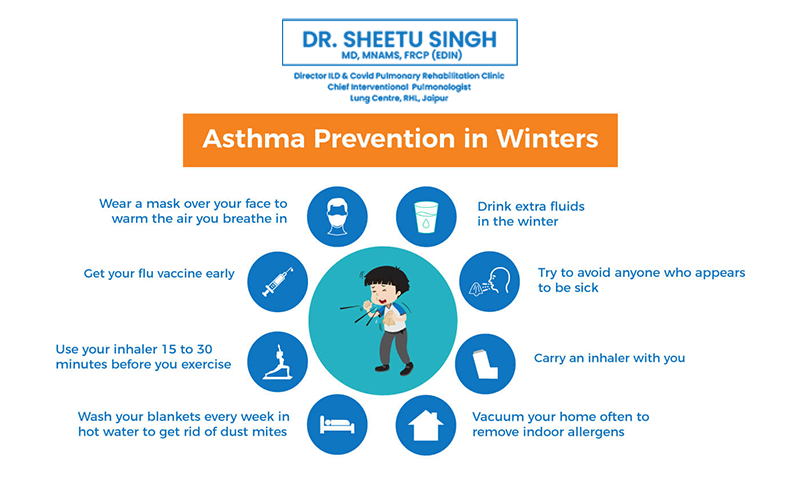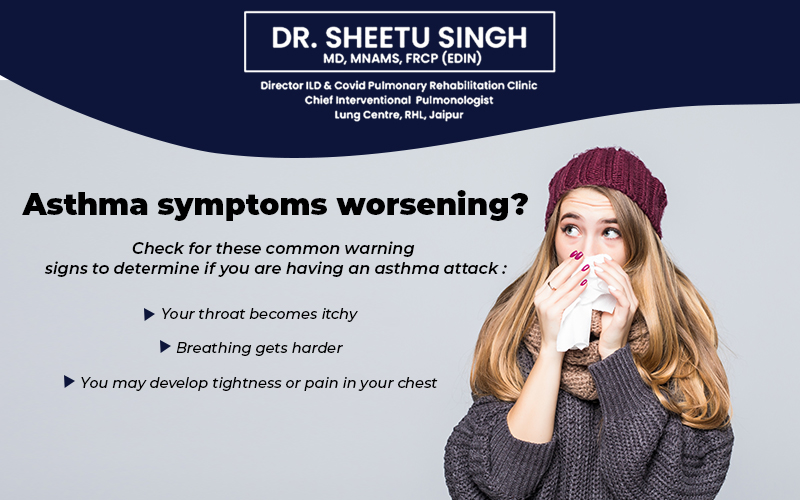Cold Air and Asthma in Winter: Cold weather is a common Asthma trigger. For many people who have asthma, the winter months can be particularly harmful. A person with Asthma has a certain amount of inflammation in these airways all the time. As a result of inflammation, they constrict and obstruct airflow to the lungs. That’s why breathing becomes more difficult for those who have asthma, even when they’re not experiencing a flare-up. Changes in weather and fluctuations in temperature are known to inflame airways and trigger Asthma flares. In those with pre-existing bronchial tube inflammation, the effects of cold weather on breathing can be severe. Dr. Sheetu Singh is a seasoned and compassionate guide for Asthma Management, particularly during the challenging winter season. Her guidance is centered on evidence-based methods and includes specific techniques to reduce triggers and enhance lung health.
Is Asthma Triggered by Cold Air?
The muscles in the airways of an asthmatic may spasm when they breathe in cold, dry air, despite the airway being forced open. This further irritates the lining of the airways and causes coughing, wheezing and shortness of breath. Asthma symptoms and flare-ups can be brought on by cold air, especially when the air is dry. The dryness of cold air can cause breathing issues for a lot of asthmatics. Cold air accompanied by windy conditions can also trigger symptoms. Dr. Sheetu Singh emphasizes the importance of preventive measures, such as ensuring proper inhaler use, staying indoors during peak pollution hours, and maintaining a warm and humidified environment.
What are Cold Weather – Induced Asthma Symptoms?
The symptoms of asthma brought on by other factors are the same during cold weather. Asthma symptoms include:
- Coughing, whether dry or with phlegm.
- Shortness of breath.
- Wheezing especially when breathing out.
- Tightness in your chest.
Why is Cold Weather Hard on People with Asthma?
- Wild Weather: Winter frequently brings cold, dry air, snow, rain, wind, and variations in air pressure, even for those in mild climates. Changes in barometric pressure can cause sinusitis, and mold spores can be stirred up by windy and rainy weather. These may also trigger exacerbations of Asthma.
- Illnesses: Flu, colds, and viruses are common in winter and can lead to more inflammation of your airways. These diseases cause the bronchial tube mucus to thicken, which makes breathing more difficult. This can worsen symptoms or cause Asthma flare-ups.
- Time Spent Indoors: You might stay indoors longer in the cold by keeping the windows closed and turning on the heat. Additionally, you can be more susceptible to respiratory infections, irritants, and allergies indoors. For example, you could be at risk for an Asthma flare if your symptoms are triggered by mold or dander, dust, or cigarette smoke if there’s a smoker in the house.
Can Cold Air Cause an Asthma Attack?
You could have an asthma attack in the winter if you have severe asthma and the cold weather triggers your symptoms. Consult your Asthma action plan to manage Asthma in cold weather. Always get medical help if your symptoms get worse. To keep cold air from causing an Asthma flare:
- Wear a scarf over your mouth and nose to warm the air before inhaling it.
- As soon as symptoms appear, use a short-acting albuterol inhaler to prevent asthma attacks from getting worse.
- Stay inside as often as you can. You can assist your airways open up by breathing in warmer air. Just make sure you’re in an area free of irritants and allergens indoors.
- If you experience symptoms frequently in cold weather, talk with your doctor about a long-term treatment plan.
Is Exercise-Induced Asthma in Cold Weather Real?
It is undoubtedly more difficult to work out outside in the cold. Not only those who have Asthma, but everyone may relate to this. In colder climates, breathing through your nose might be less taxing on your body, but exercising frequently necessitates breathing through your mouth to take in more air. Breathing through your mouth brings the cold, dry air straight to your airways. The air in those bronchial tubes permits the mucus coating them to dry out. This can make symptoms worse or trigger a flare-up of Asthma. If you prefer to exercise outside, or you enjoy Skiing or ice skating, try doing a warm-up before leaving the house.
In case you suffer from exercise-induced asthma or exercise-induced bronchospasm (EIB), your physician can advise using a short-acting albuterol inhaler for 15 to 20 minutes before engaging in physical activity. This pre-treats your airways so they are better prepared for physical activity and cold weather.
How to Handle Asthma in the Winter
When the cold weather aggravates your asthma, what can you do to reduce symptoms?
- Wear a scarf and use it to warm the air you’re breathing.
- Limit outdoor exercise. Work out at home or in the gym.
- Put humidifiers to use in your house. Make sure they don’t grow mold.
- Wash hands frequently. Washing with soap for 20 seconds or using hand sanitizer while out can keep winter illnesses at bay.
- Be conscious of your hands. Keep them away from your eyes and face to avoid spreading germs.
- Obtain the flu shot in the early fall. Remain current with COVID-19 vaccinations.
- Limit time with pets if you’re allergic to pet dander. Keep your bedroom pet-free.
- If mold and dust mites aggravate your symptoms, keep your house dry and cool to prevent their growth.
Is Cold Air Good for Asthma?
Most persons who have asthma should avoid cold air because it irritates their bronchial tubes and exacerbates their symptoms. If you have Asthma, it may be best for you to stay indoors as much as possible during cold winter weather. Incorporate HEPA filters into your ventilation systems and keep an eye on the quality of the air indoors. Keep an eye out for any indications of mold and get rid of it right away. Install dust mite-proof pillows and mattress covers in your bedding. To assist in clearing the air within your home of pet dander and other allergens, think about purchasing an air purifier or air cleaner.
Modern homes have better insulations and windows. They better retain heat and are less drafty. However, this implies that carpets, drapes, furniture, and bedding can retain moisture, which promotes the growth of dust mites. Use dehumidifiers and maintain your home’s humidity below 50% to help prevent the growth of dust mites. When the weather allows, open your windows for one hour per day to reduce humidity in the house.



